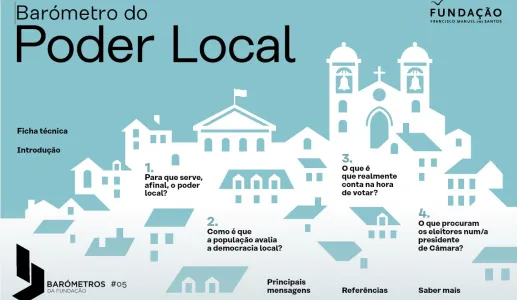Local Government Barometer
Over time, as democracy was slowly and steadily consolidated, municipalities and parishes became vital actors for implementing local public policies and building territorial cohesion.
How do the people rate the quality and effectiveness of local policies? How much confidence do people living in Portugal have in local authorities? What characteristics do voters value most in their choice of a mayor? FFMS has launched a new barometer that looks at what people living in Portugal know, believe and think about local government.
Chief among the main conclusions of this research are that the people living in Portugal tend to look positively at local government, particularly outside large towns and cities, and trust in the local authorities and the level of satisfaction with local democracy are higher in non-urban municipalities.
However, the data show that civic participation is low: 54% of the people interviewed have never taken part in meetings or events organised by the local authorities.
More than half of the people interviewed are in favour of decentralisation and regionalisation, and 62% of them believe that investments and public services should be adapted to regional circumstances and needs.
The people interviewed are of the opinion that the mayor is the main symbol of local government: over 60% believe the mayor is the most influential figure when it comes to defining the policies adopted.
The barometer also concludes that votes in local elections are more personal than party political. This is because the decisions of the voters are heavily influenced by the performance of the Municipal Council and by the personal characteristics of the candidates, with an emphasis on ethical integrity. This factor was seen to carry more relative weight (27%) in the choice of a mayor.





